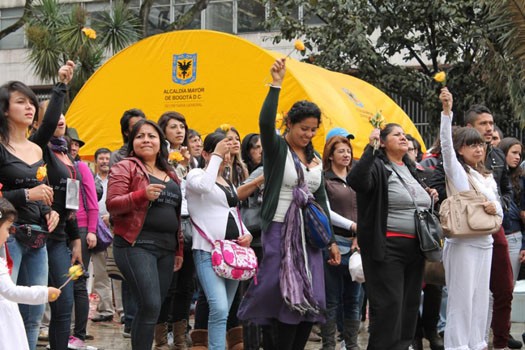As the peace talks progress between the Colombian government and FARC representatives in Havana, many Colombians are increasingly hopeful that the country will be able to put an end to more than 50 years of armed conflict. Despite broad support by many different sectors of society, the negotiations have been controversial, and some people still oppose a political deal with the biggest insurgent group in the country.
With the aim of reinforcing the legitimacy of the peace process, which could lead to a historic compromise that would deeply influence the future of the country, thousands of Colombians are marching today to express their support for the discussions, for peace, and for democracy. Their motto is: “We are the majority: Now is the time for peace!”
In 2012, the victims’ law established today, April 9th, as the National Day for Memory and Solidarity with Victims. “On Victims’ Day, we demand peace. This is a necessary condition for real guarantees of non-repetition. ICTJ supports the march because we believe that it is possible to reach just and sustainable peace in Colombia,” states María Camila Moreno, head of ICTJ’s Colombia office.
There are mass gatherings starting at 9:00am in all major cities of the country. Hundreds will travel from towns near Bogotá to participate in the national march that is taking place in the streets of the capital. One meeting point is the Center for Memory, Peace, and Reconciliation, which is also officially opening to the public for the first time today. In the center, before the march starts, a series of artistic presentations will pay homage to the victims of the armed conflict. Among those exhibitions, there will be a photography exhibition “Images to Resist Oblivion,” organized jointly by the Center for Historic Memory and ICTJ.
Colombia’s president, Juan Manuel Santos, and the mayor of Bogotá, Gustavo Petro, will march together from the Center for Memory, Peace, and Reconciliation, as a symbolic act of invitation to overcome political and social polarization, and to support a political resolution to the armed conflict.
A victims’ leader and congressman, Iván Cepeda, said that the march’s goal is to honor the victims and to “put an end to the armed conflict through political dialogue.” The mayor of Bogotá stated that “we need a massive mobilization, deeply massive, so that it can neutralize those who are trying to sabotage peace.”
Marches all over the country
Besides the Center for Memory, Peace, and Reconciliation, there are seven other meeting points from which to start the march in Bogotá. Special bus services have been organized so that hundreds of people from nearby towns can join the main march taking place in the capital.
Other marches will be held in Medellín, the second biggest city in Colombia. Dozens of indigenous people from the region have traveled to the city to join the march, which starts at 12:00pm. Also, in Cúcuta, a northern city on the border of Venezuela, civil society organizations and communities have organized a march starting at the main church, La Candelaria. They will all chant: “We are the majority: Now is the time for peace!”
See photos from the events here PHOTO: Women celebrating Victims' Day in Bogotá, Colombia, on April 9th 2012.
